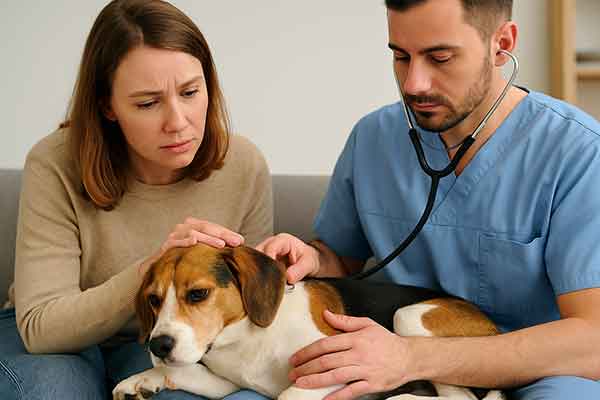Is Pneumonia Contagious in Dogs? – Causes, Symptoms & Prevention
Pneumonia in dogs can be a serious and concerning condition for pet owners. One of the most common questions is: is pneumonia contagious in dogs? In this article, we’ll explore the types of canine pneumonia, how it spreads, and what steps you can take to prevent infection and keep your dog healthy.
Table of Contents
- What Is Dog Pneumonia?
- Is Pneumonia Contagious in Dogs?
- Types of Pneumonia in Dogs
- How Pneumonia Spreads in Dogs
- Signs and Symptoms of Pneumonia
- Diagnosis and Treatment
- Prevention Tips
- When to See a Vet
- FAQ
What Is Dog Pneumonia?
Pneumonia is a condition in which the lungs become inflamed and filled with fluid or pus. In dogs, this can lead to difficulty breathing, coughing, and lethargy. It may be caused by bacterial, viral, fungal, or aspiration-related factors, depending on the dog’s health and environment.
Is Pneumonia Contagious in Dogs?
The answer depends on the underlying cause of the pneumonia. Some forms, like bacterial or viral pneumonia, can be contagious to other dogs through close contact, shared water bowls, or airborne droplets. Others, like aspiration pneumonia, are not contagious because they result from inhaling food or vomit rather than an infectious agent.
Types of Pneumonia in Dogs
Understanding the type of pneumonia your dog has is crucial to determining whether it’s contagious:
- Bacterial Pneumonia: Caused by bacteria such as Bordetella bronchiseptica. Often contagious.
- Viral Pneumonia: Linked to viruses like canine influenza or parainfluenza. Also contagious.
- Aspiration Pneumonia: Occurs when dogs inhale food, vomit, or liquids. Not contagious.
- Fungal Pneumonia: Caused by fungi like blastomycosis. Rare and not typically contagious between dogs.
How Pneumonia Spreads in Dogs
Contagious pneumonia in dogs can spread through:
- Direct nose-to-nose contact with an infected dog
- Airborne respiratory droplets (coughing or sneezing)
- Shared water bowls or toys
- Contaminated surfaces at dog parks, kennels, or shelters
Young puppies, senior dogs, or those with compromised immune systems are at greater risk of contracting contagious pneumonia.

Signs and Symptoms of Pneumonia
Early detection can improve outcomes. Look for these common signs of pneumonia in dogs:
- Persistent coughing
- Rapid or labored breathing
- Fever
- Loss of appetite
- Lethargy or weakness
- Discharge from the nose
- Blue-tinged gums (in severe cases)
Diagnosis and Treatment
Veterinarians diagnose pneumonia using a combination of physical exams, chest X-rays, blood tests, and sometimes bronchoscopy. Treatment depends on the cause and severity:
- Antibiotics: For bacterial infections
- Antiviral drugs: In some viral cases
- Oxygen therapy: For dogs with breathing difficulty
- Fluids and rest: To support recovery
- Hospitalization: For severe cases requiring intensive care
Prevention Tips
To reduce the risk of pneumonia spreading or developing:
- Keep vaccinations up to date (especially Bordetella and canine influenza)
- Avoid contact with sick dogs
- Sanitize bowls, bedding, and toys regularly
- Supervise eating and drinking to prevent aspiration
- Maintain a healthy immune system through proper nutrition and exercise
When to See a Vet
If your dog shows signs of coughing, labored breathing, or unusual fatigue, consult your vet promptly. Early intervention can prevent complications and reduce the risk of spreading illness to other dogs.
FAQ
Is canine pneumonia contagious to humans?
In most cases, no. Canine pneumonia typically doesn’t pose a risk to humans. However, rare cases involving zoonotic bacteria (like certain strains of Bordetella) could potentially spread to immunocompromised people. Always wash your hands after handling a sick dog.
How long is a dog with pneumonia contagious?
A dog with contagious pneumonia may shed the virus or bacteria for up to 2–3 weeks, depending on the severity and treatment. Keep infected dogs isolated from others during this period.
Can dogs get pneumonia from cold weather?
Cold, damp weather doesn’t cause pneumonia directly, but it can weaken a dog’s immune system and make them more susceptible to respiratory infections that could lead to pneumonia.
Is kennel cough the same as pneumonia?
No. Kennel cough is a milder upper respiratory infection, though it can progress into pneumonia if left untreated. Both can be contagious, but pneumonia is typically more severe.
Conclusion
So, is pneumonia contagious in dogs? It can be — depending on the cause. Bacterial and viral pneumonias are contagious and should be handled with care, while aspiration and fungal pneumonias are not. Recognizing symptoms early, practicing good hygiene, and seeking prompt veterinary care can make a significant difference in your dog’s recovery and safety.
Protect your furry companion by staying informed, acting early, and maintaining regular vet visits. A little precaution goes a long way toward a healthy, happy dog.

